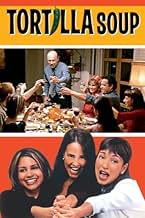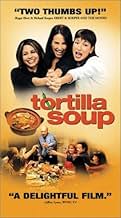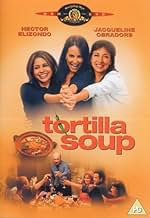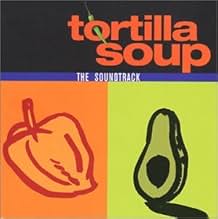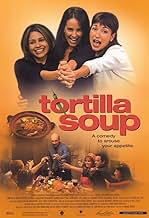IMDb RATING
6.7/10
5.4K
YOUR RATING
A Mexican-American master chef and father to three daughters has lost his taste for food, but not for life.A Mexican-American master chef and father to three daughters has lost his taste for food, but not for life.A Mexican-American master chef and father to three daughters has lost his taste for food, but not for life.
- Awards
- 2 wins & 7 nominations
Jude Herrera
- Eden
- (as a different name)
Storyline
Did you know
- TriviaThe plot of this movie is a Hispanic version of Eat Drink Man Woman (1994), about an aging widower chef who raised three daughters alone, both being written by Ang Lee. Even the opening crisis, the restaurant previously run by the chef has ruined the main feature of a huge banquet and he is called in to save the day, is the same.
- GoofsAt the end when Carmen is leaving the kitchen to serve her family, at first she has one plate without the lobster, then when she is leaving the kitchen, as she is turning the corner, she has the plate with a lobster. Then, coming out of the kitchen, the lobster has disappeared, then reappears again when she turns towards the tables.
- Quotes
Carmen Naranjo: Do you know why we clink glasses before drinking?... It's so that all the five senses are involved. We touch the glass. We smell the drink. We see its color. We taste it. Hearing is the only sense that doesn't participate unless we create it.
Featured review
In LA, a Mexican American chef (Hector Elizondo) has problems with his three grown up daughters and tries to remain the patriarch to the family for them all.
Foodie analogies are abound in this fairly genteel family drama. It is a remake of Ang Lee's EAT, DRINK, MAN, WOMAN (1994) and is able to remain faithfull to Lee's film and comes over quite well. Raquel Welch, while a highlight in the film is hit and miss as Elizondo's brassy and blousey girlfriend in this light, but fun film.
Foodie analogies are abound in this fairly genteel family drama. It is a remake of Ang Lee's EAT, DRINK, MAN, WOMAN (1994) and is able to remain faithfull to Lee's film and comes over quite well. Raquel Welch, while a highlight in the film is hit and miss as Elizondo's brassy and blousey girlfriend in this light, but fun film.
- vampire_hounddog
- Aug 20, 2020
- Permalink
- How long is Tortilla Soup?Powered by Alexa
Details
- Release date
- Country of origin
- Official site
- Languages
- Also known as
- Мале тајне великих мајстора
- Filming locations
- Marshall Fundamental Secondary School - 990 Allen Avenue, Pasadena, California, USA(School where Leticia Naranjo teaches)
- Production companies
- See more company credits at IMDbPro
Box office
- Gross US & Canada
- $4,467,615
- Opening weekend US & Canada
- $653,729
- Aug 26, 2001
- Gross worldwide
- $4,634,077
Contribute to this page
Suggest an edit or add missing content









